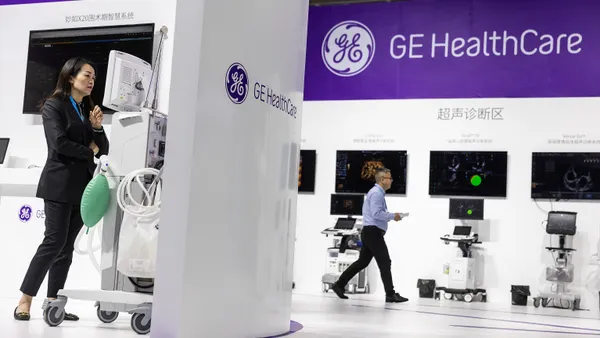Dive Brief:
- Ashley McEvoy, who leads Johnson & Johnson’s $27 billion medtech business, was named chair of AdvaMed’s board of directors for a two-year term starting on Tuesday. She has been part of AdvaMed’s board since 2018.
- McEvoy will succeed Michael Minogue, Abiomed’s former CEO, who led AdvaMed’s board for a previous two-year term.
- The medtech association’s board unanimously elected McEvoy at its most recent quarterly meeting. “I know I speak for the entire Board when I say we look forward to a bright future for AdvaMed and the industry with Ashley at the helm,” AdvaMed CEO Scott Whitaker said in a statement.
Dive Insight:
During her two years leading AdvaMed’s board, McEvoy’s priorities will include shoring up the resiliency of health systems and supply chains, creating policies that promote the responsible use of data, and enacting programs to increase diversity and representation in clinical research.
“Our healthcare systems have been rocked in a COVID world, and we want to make sure that we are delivering superb clinical care and having reliable supply chains,” McEvoy said in an interview.
McEvoy said AdvaMed still believes in global supply chains — many of its members are global companies — but the trade group will continue to work with the Food and Drug Administration to make sure critical components are prioritized for healthcare, and will advocate for transparency of essential parts of the supply chain. Earlier this year, when shortages of semiconductor chips rippled across the industry, AdvaMed called for the government to give medical device makers priority access to available microchips.
Focusing on increasing digitization in the medtech industry, McEvoy sees an opportunity to reach new customers and reduce variability in procedures. But she also sees a need for a code of ethics around data governance and privacy in an increasingly data-rich world.
“It's something that's good for patients, it's good for hospital systems and all of us. So I'm gonna nudge us along in that regard,” she said.
Improving the way clinical trials are run will be another priority, said McEvoy. To increase diversity, McEvoy said, she’ll be calling for closer collaboration with the FDA and for training diverse principal investigators. She also sees a role for technology to make the clinical trial process easier for patients, such as telehealth being offered as an option for follow-up visits.
To speed Medicare coverage for breakthrough devices and diagnostics, AdvaMed is working with the Centers for Medicare and Medicaid Services on Transitional Coverage of Emerging Technologies (TCET), a policy that would create an expedited pathway to approval if certain evidence requirements are met, she said.
McEvoy also plans to watch the fifth iteration of the Medical Device User Fee Agreements (MDUFA V), which sets FDA funding and review times for medical devices. The policy went into effect at the end of the year.
“We'll go through quarterly dashboard reviews to make sure that there's good science and they're getting the resources that they need,” McEvoy said.












